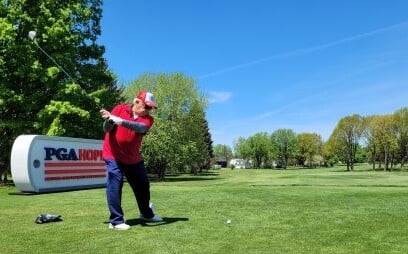‘Sergeant Hammer’ Hammers Home Important Message to Vets
July 29, 2025 / by NCGA Staff

Longtime PGA pro Joe Vavra has found a second calling helping veterans to learn the game and so much more

By Ron Kroichick
Joe Vavra acknowledges his good fortune.
He expected to land in Vietnam after he enlisted in the Army, upon his graduation from Binghamton University in upstate New York. But he ended up at Fort Ord, right here in Northern California, playing on the football team and serving as golf pro, sharpening his game during rounds at Pebble Beach Golf Links and Spyglass Hill.
Vavra still might have gone to Vietnam, except a golf cart accident left him in the hospital for a month with severe injuries to his left leg and ankle. That hospital stay had a profound impact. He saw young soldiers just back from the war, waking up and screaming in terror in the middle of the night.
“That was my first visual of what war does,” Vavra says today. “That carried me to why I give back now.”
.jpg?width=500&height=500&name=BigJoe_longarmofthegolflaw%20(1).jpg)
Fast forward to 2025. Vavra is 79, retired from his career as a PGA professional, in which he taught the game throughout the Bay Area, including stops at Richmond Country Club, Olympic Club and Harding Park. The first military lessons he gave at Fort Ord, way back in 1968, launched a long and satisfying journey in golf.
Even so, the past nine years have offered another level of satisfaction and impact. Vavra, a 2023 NCPGA Patriot Award winner, became involved in PGA Hope, a six-to-eight-week program for veterans to learn golf from PGA pros “trained in adaptive golf and military cultural competency.”
The program seeks to teach the game’s technical elements, while also providing an opportunity to connect with other veterans. PGA Hope operates at more than 200 facilities in 46 states across the country.
Put another way: It’s the perfect platform for Vavra.

He started teaching veterans in 2016, at Presidio Golf Course in San Francisco. He later spent time at Metropolitan GC in Oakland and then at Mariners Point in Foster City. It didn’t take long for him to understand the deeper meaning of the program.
“Wow, it gave me insight into what these guys went through,” Vavra says. “The Army was good to me, but some of these people went through hell. I didn’t have to go to war and go through what they went through.
“We had guys from back in Vietnam, and also Afghanistan and Iraq. It totally inspired me and gave me a passion to do this.”
One of those Vietnam combat veterans is John Reissenweber, a 77-year-old San Francisco resident. He traced a difficult road: Reissenweber didn’t have a friend for 25 years, he says, and planned to kill himself about six years ago.
Then, during his mental evaluation at the San Francisco VA Medical Center, doctors noticed he had played golf earlier in his life. They asked if he wanted to get back into it. He agreed.
“It saved my life,” Reissenweber says.
He soon crossed paths with Vavra. They hit it off, and before long Reissenweber attended nearly every one of Vavra’s clinics.
Reissenweber calls him Sergeant Hammer, like many other veterans do. That’s a playful nod to the grip Vavra teaches; if you hold the golf club correctly, as he puts it, you should be able to pound a nail with it. Hence, the nickname.
But the connection between Vavra and Reissenweber stretches much deeper.

“Joe has a way to speak with both authority and compassion to the veterans, and draw them out,” Reissenweber says. “He’s very warm-hearted. He spends one-on-one time with everybody, makes them feel worthy and gives them confidence.
“He talks to them with dignity. You can see the bond between Joe and other veterans – he pats them on the back and gently kicks them in the butt. He has the uncanny ability to reach into someone and just connect.”
Vavra made such an impact on Reissenweber, he became an ambassador for PGA Hope. Reissenweber now works 30-plus hours a week as a volunteer, overseeing the programs at Presidio, Metro, Mariners Point and Moffett Field.
Vavra, meantime, savors the family-like bond with other military veterans. He compares it to the connection he feels with fellow PGA pros.
Among many examples, Vavra taught one frail veteran at Presidio. The man was confined to a wheelchair and used a special golf cart with one seat, strapped in so he could swing a club.
He enjoyed smacking the ball and kept working at it, laser focused. Eventually, he hit a driver about 100 yards.
.jpg?width=500&height=500&name=BigJoewithJimmie%20(1).jpg)
“I can still picture his face,” Vavra says. “His smile was incredible.”
Vavra also has taught younger veterans at Mariners Point. Several of them went through drug and alcohol rehabilitation, and many hadn’t played golf before.
One of them, an Iraq war veteran in his late 20s or early 30s, wouldn’t talk to Vavra at first, hardly even looked at him. He was new to the game, but by the third session he didn’t want to leave the practice range. By the fifth session, Vavra had him hitting slight draws with his 5-iron.
More important: The man had post-traumatic syndrome, Vavra says, but golf helped him start verbalizing.
“When this program started, it was basically promoting instruction,” Vavra says. “We wanted to enable them to start playing. … Now I see my former students who were beginners, on these play days, and they’re interacting with other veterans. It’s tremendous.

“It’s the social aspect they get after they play – that’s rewarding to me. They now have a life with other veterans.”
The San Mateo Veterans Affairs Commission recently recognized Vavra and PGA Hope, giving the program its “Enterprise of the Year” award for improving veterans’ lives.
And that, ultimately, is bigger than golf.
Ron Kroichick covers golf for the San Francisco Chronicle.